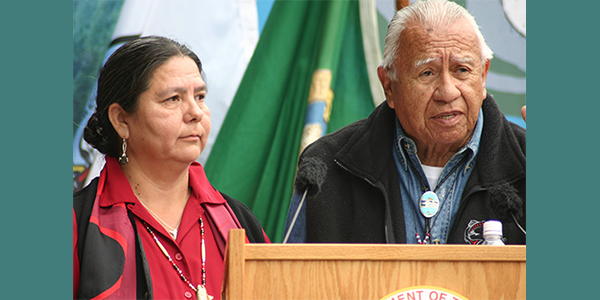||| FROM THE SALISH CURRENT |||
Washington treaty tribes will mark the 50th anniversary of the Boldt Decision on Feb. 6–7 at the Muckleshoot Events Center in Auburn. Some 500 people are registered to attend, according to the Northwest Indian Fisheries Commission.
Washingtonians got a lesson in treaty law and tribal sovereignty when U.S. District Court Judge George H. Boldt made his Feb. 12, 1974, ruling in United States v. State of Washington.
The landmark decision affirmed the treaty rights of Native nations that ceded much of Western Washington to the U.S. in 1855 but reserved for themselves and their descendants certain inherent rights — chief among them the right to fish, hunt and gather resources throughout their usual and accustomed areas.
To non-Native commercial and recreational fishers, the ruling was more a gut punch than a lesson in the law. Boldt’s decision was challenged by the state but upheld by the U.S. Supreme Court.
In his ruling, Boldt determined that Native treaty signers’ understanding in 1855 was that they were extending to non-Natives 50% of the harvestable salmon catch and reserving 50% for their people. Henceforth, Boldt ruled, tribal governments and the state must co-manage fisheries to ensure salmon is available and the treaty is honored.
The matter of sovereignty
Boldt’s ruling also cast tribes and the treaties in a different light: They were Native nations that never ceded their sovereignty and treaties are, the U.S. Constitution states, the “supreme law of the land.” That means the Treaty of Point Elliott, for example, carries as much weight and authority as a treaty between the U.S. and a foreign government.
“The Boldt decision really didn’t strengthen our beliefs in who we are and what we stand for and our rights as citizens here in this country. What it did was amplify it,” said Darrell Hillaire, a former Lummi Nation chairman and founder of Children of the Setting Sun Productions, a Bellingham-based nonprofit that produces multimedia cultural presentations.
“We knew all along pre-Boldt there were so many legal fights or political fights to remind people, ‘Hey, we have an agreement here and it was two sovereigns making that agreement.’,” Hillaire said. “That was always the belief and it was the Boldt Decision that amplified that through that time — the Civil Rights era, the Vietnam War. It was a recognition of who we are as a people and the rights we stand for.”
If the Boldt Decision affirmed the sovereignty of tribal nations, decisions that followed gave their influence more traction.
Gaming revenues
The federal Indian Gaming Regulatory Act of 1988 recognized the authority of tribal nations to regulate gaming on their lands. Gaming revenues spawned economic development, which in turn led to land buybacks and environmental defense and treaty rights protection.
Today, Native nations that share geography with Washington state have more than 24,600 square miles within their jurisdictions — combined, that’s more land mass than 107 recognized nations of the world, between Latvia and Croatia. And they are economic powerhouses, with investments in construction, energy, entertainment, health, media and recreation.
Native nations directly employ more than 37,000 people, according to the Washington Indian Gaming Association, and annually pay about $1.5 billion in wages and benefits and $1.2 billion in state and local taxes. In addition, they invest hundreds of millions of dollars each year in economic development, emergency services, housing, public safety, transportation and utilities, the gaming association reported.
Locally:
- Lummi Nation-owned enterprises include Silver Reef Casino Resort, Loomis Trail Golf Course, Lummi Bay Markets, and Salish Village commercial center. Lummi also owns and operates Lummi Nation School, and the headquarters campus of Northwest Indian College, founded by the Lummi Nation, is located on the reservation.
- The Nooksack Tribe owns Nooksack Northwood Casino and the Nooksack Center minimart, and Between the Ferns Cannabis in Deming.
- The Upper Skagit Tribe owns Hometown Pharmacy near Sedro-Woolley, Skagit Valley Casino Resort, The Skagit Ridge Hotel, Encore restaurant, the Market Buffet and Bow Hill Gas and Food Mart.
- The Swinomish Tribe owns Swinomish Casino and Lodge, Swinomish Golf Links, Swinomish Markets, Swinomish RV Park, and three gas stations and convenience stores. The tribe leases land to various enterprises; it also owns didgʷálič Wellness Center, which provides substance abuse treatment services for Native and non-Native clients.
- The Samish Indian Nation owns Fidalgo Bay Resort, Samcor Fuel and Tobacco, the Cannery Building, and a waterfront business office building in Anacortes. Samish also owns Samish Longhouse Preschool, which provides pre-K education and day care for Native and non-Native students.
PHOTO ABOVE: Northwest Indian Fisheries Commission Chairman Billy Frank Jr. (1931-2014) speaks at the 2011 ceremony marking the beginning of deconstruction of the Elwha Dam. Looking on is Lower Elwha Klallam Tribe Chairwoman Frances Charles. Native leaders were successful in their push to see the Elwha and Glines dams removed on the Elwha River, freeing up upriver habitat for salmon and other species. (Richard Walker © 2011)
**If you are reading theOrcasonian for free, thank your fellow islanders. If you would like to support theOrcasonian CLICK HERE to set your modestly-priced, voluntary subscription. Otherwise, no worries; we’re happy to share with you.**








